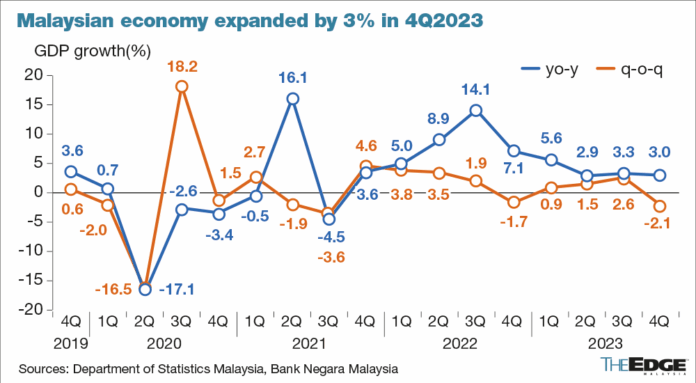BY TENGKU NOOR SHAMSIAH TENGKU ABDULLAH
KUALA LUMPUR: As Malaysia takes centre stage hosting the 47th ASEAN Summit and Related Summits in Kuala Lumpur from October 26 to 28, the nation’s economic resilience is once again under the global spotlight.
Under the 2025 ASEAN Chairmanship theme of “Inclusivity and Sustainability,” Malaysia’s steady growth and disciplined governance have not only strengthened its domestic fundamentals but also enhanced its credibility as a key economic anchor in Southeast Asia.
Malaysia’s macroeconomic performance in 2025 reflects a powerful combination of disciplined policy execution, resilient domestic demand, and investor confidence built on institutional credibility.
The economy continues to deliver consistent results — expanding 4.4 per cent in the first quarter, 4.5 per cent in the second, and accelerating to 5.2 per cent in the third — lifting the year-to-date average to 4.7 per cent, at the upper end of Bank Negara Malaysia’s forecast range of 4.0 to 4.8 per cent.
“This performance is not an accident of external tides,” said Shan Saeed, Global Chief Economist at Juwai IQI, in an interview with TNS News. “It’s a reflection of Malaysia’s endogenous, self-sustaining growth model — driven by strong household spending, a diversified industrial base, and a steadfast commitment to macroeconomic stability.”
At a time when the global economy remains sluggish — with the IMF projecting world GDP at 3.2 per cent and the Eurozone at just 1.1 per cent — Malaysia continues to outperform regional peers.
The services sector has grown beyond 5 per cent, while manufacturing momentum remains robust, powered by electronics, precision engineering, and green-technology investments.
Approved investments in the first half of 2025 exceeded RM170 billion, with nearly 57 per cent channelled into high-value sectors such as electronics, logistics, and renewable energy — a clear signal of investor trust in Malaysia’s reform path and policy continuity.
“My call on the Malaysian Ringgit remains intact — a trading range of RM4.10 to RM4.30 against the U.S. dollar for 2025,” Shan noted. “The Ringgit is trading around RM4.23 in the open market right now, showing remarkable composure despite dollar strength in the first half of the year.”
He credited Bank Negara Malaysia’s prudent management for the currency’s stability.
“The central bank has balanced growth and inflation dynamics with prudence, ensuring that interest-rate adjustments preserve domestic purchasing power without destabilising capital flows.
Bank Negara’s stewardship deserves recognition for maintaining structural stability in the Ringgit, keeping volatility contained, and reinforcing Malaysia’s reputation as a disciplined and well-governed emerging-market economy,” Shan said.
Malaysia’s economic renewal is being powered by three new growth drivers.
First, the digital and green transition is accelerating, with the Malaysia Digital Economy Blueprint and the National Energy Transition Roadmap (NETR) attracting investments in ICT, renewable energy, EV batteries, and energy storage — positioning Malaysia as a regional hub for sustainability-linked capital.
Second, household consumption, which makes up nearly 58 per cent of GDP, remains strong, underpinned by employment growth and targeted fiscal incentives.
Third, Malaysia’s active role in ASEAN economic integration through ATIGA 2025 and the ASEAN Digital Economy Framework Agreement (DEFA) enhances its advantage as the region’s trade and digital connectivity hub.
Fiscal discipline remains the cornerstone of Malaysia’s economic management. The budget deficit is projected to narrow to 3.8 per cent of GDP, down from 5.6 per cent in 2021, reflecting credible fiscal consolidation and efficient spending.
External reserves hover near US$113 billion, while the 10-year Malaysian Government Securities (MGS) yield remains below 4.1 per cent — a reflection of deep investor confidence in Malaysia’s sovereign fundamentals.
“Fiscal discipline and investor confidence move in tandem,” Shan observed. “Markets reward governments that stay consistent, transparent, and pragmatic. Malaysia has achieved that balance under its current policy framework.”
In an environment marked by monetary tightening, supply-chain shifts, and geopolitical fragmentation, Malaysia stands out as an island of macroeconomic stability, where fiscal prudence, monetary credibility, and trade diversification converge.
“If current momentum holds, Malaysia’s full-year GDP growth could land between 5.1 and 6.0 per cent,” said Shan. “This reaffirms the country’s position as ASEAN’s most credible growth anchor and a magnet for long-term sustainable investment capital.”
He added, “Malaysia’s 2025 narrative is one of discipline, foresight, and continuity — a nation balancing ambition with prudence, growth with governance, and policy with purpose. Malaysia will remain on global investors’ radar.”
The 47th ASEAN Summit provides a timely backdrop to that narrative. As world leaders gather in Kuala Lumpur to discuss regional peace, economic resilience, and inclusive growth, Malaysia’s performance offers a living example of how disciplined governance can underpin sustainable prosperity — not only at home but across ASEAN.
Shan Saeed is the Global Chief Economist at Juwai IQI, a global real estate and investment advisory group headquartered in Kuala Lumpur with offices across Asia, the Middle East, Africa, and North America.
With more than 25 years of experience in financial markets, Shan is widely known for his insights on macroeconomic trends, currency movements, and capital flows in emerging economies.
TNS NEWS


